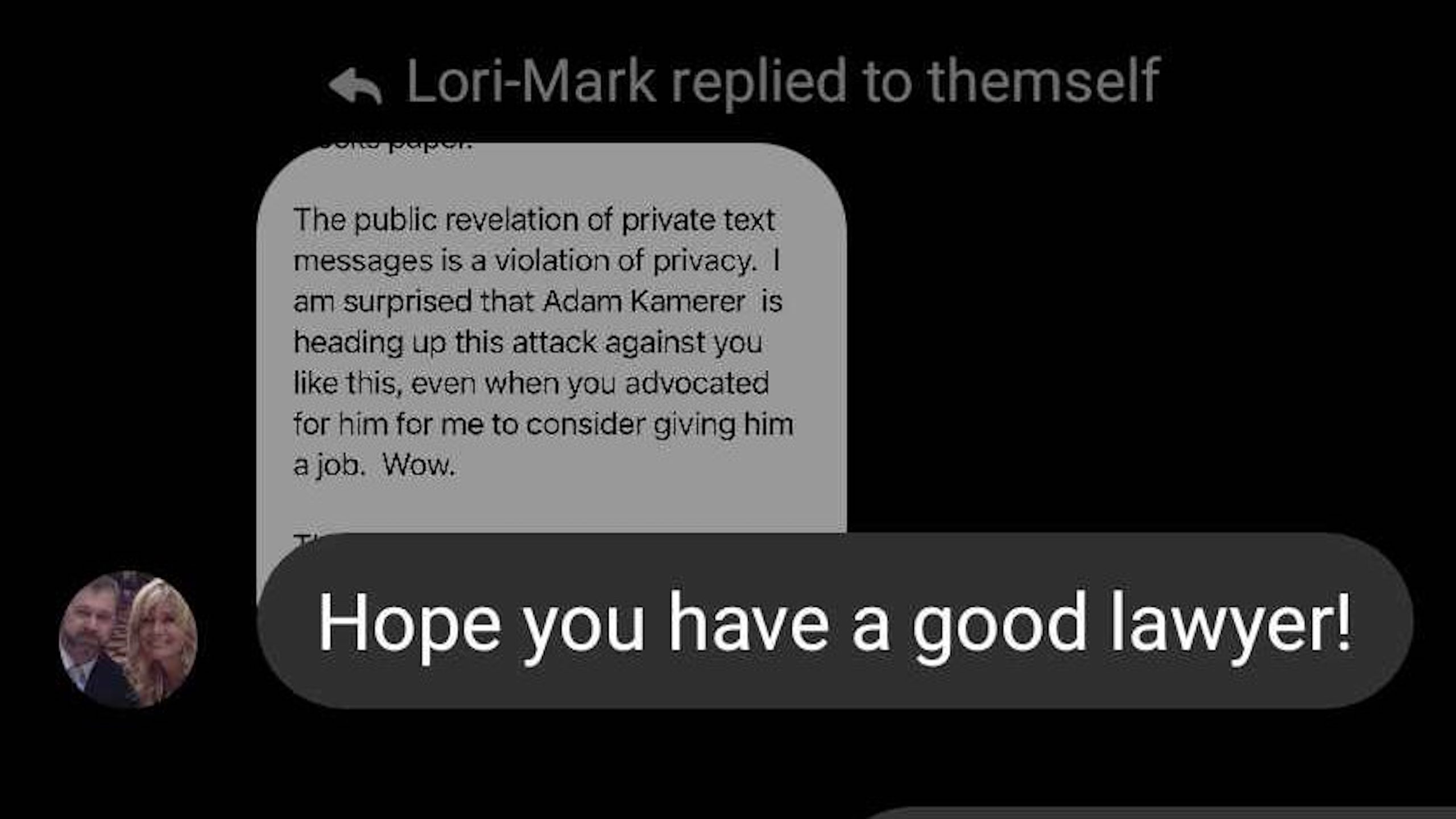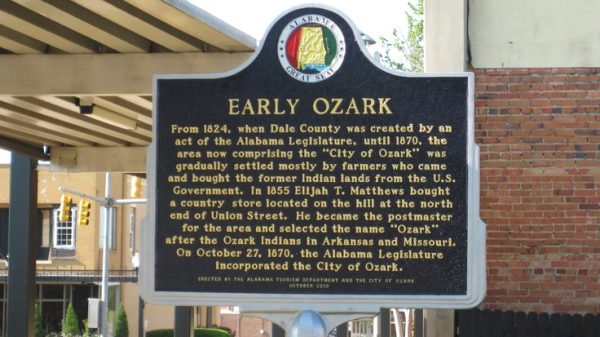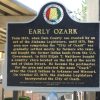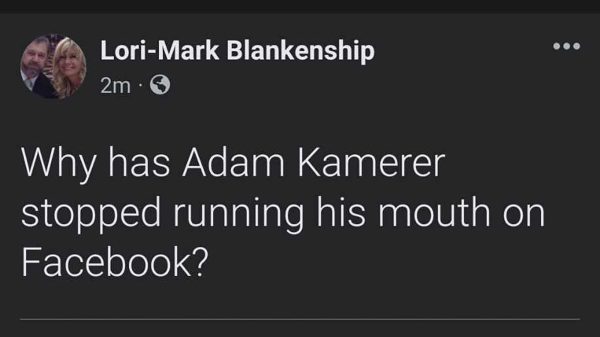|
Getting your Trinity Audio player ready...
|
At a public library board meeting Wednesday, Ozark citizen Adam Kamerer read aloud text messages exchanged between public officials including Ozark Mayor Mark Blankenship.
On Thursday, either Mark Blankenship or his wife, Lori, or both, sent Kamerer a message: “Hope you have a good lawyer!” The Blankenships share a joint Facebook account, making exact attribution more difficult.
The message followed a screenshot Blankenship took of an email he received from an unknown source, opining that the public reading of the private text messages violated the mayor’s privacy. Blankenship sent that screenshot to Kamerer.
“The public revelation of private text messages is a violation of privacy,” the sender tells Blankenship. “… Those text messages have been published online and I would give them notice if privacy violation as they were private conversations and not with the media or the press. Seems they were leaked by the library. The library do not have any protections.”
Except, Kamerer obtained the messages via an open records request under the Alabama Open Records Act. APR has reviewed the message, which refers to the request as a FOIA request. Technically, a FOIA request relates to the federal Freedom Of Information Act, which is separate from the Alabama Open Records Act and applies to federal governments. But that common conflation doesn’t change what is considered public record under the Alabama Open Records Act.
According to the act, found in Section 36-12-40 of the Code of Alabama, “every citizen has a right to inspect and take a copy of any public writing of this state, except as otherwise expressly provided by statute.”
There are a variety of exceptions, including such information as circulation and registration records at libraries, records that concern security plans and measures, records that could compromise critical infrastructure, etc. The full list can be found in the code section. None of the exemptions appear to apply to the messages obtained by Kamerer, and there is no reason to believe reading those public records in a public setting would constitute any violation of privacy.
The statute does not expressly define public writings, but also does not exempt them. Text messages are considered public records in many other states as well as under FOIA, which could lend credibility to a defense of the text messages as public record. And those text messages are considered public record even when sent or received on private devices. In case history on Alabama’s 100-year-old open records law, the language has been construed liberally in favor of the public, given its breadth.
In fact, a lawsuit on the matter could actually strengthen the Alabama Open Records Act by demonstrating explicitly that text messages should be considered public record under the act.
Journalist Kyle Whitmire of AL.com used this same process to retrieve text messages between State Sen. Chris Elliott, R-Josephine, and Department of Archives Director Steve Murray just a few months ago in relation to a dispute over the Archives hosting a lunchtime program discussing the rocky history of archiving LGBTQ+ history.
Furthermore, there is very little evidence that text messages are even considered private between the correspondents themselves. And the person that released the test to Kamerer, in line with the Alabama Open Records Act, could have just as easily released the message themselves as a correspondent in the conversation.
And the email to Blankenship suggests the library has no protections. It is unclear exactly what that means. But while the Blankenships may “hope (Adam Kamerer) has a good lawyer),” they should know that the Ozark Dale Public Library Board does have a lawyer, as they just hired Sara Elizabeth Matthews-Hile on a $3,500 retainer at the same meeting in which Kamerer began reading the texts aloud.
-
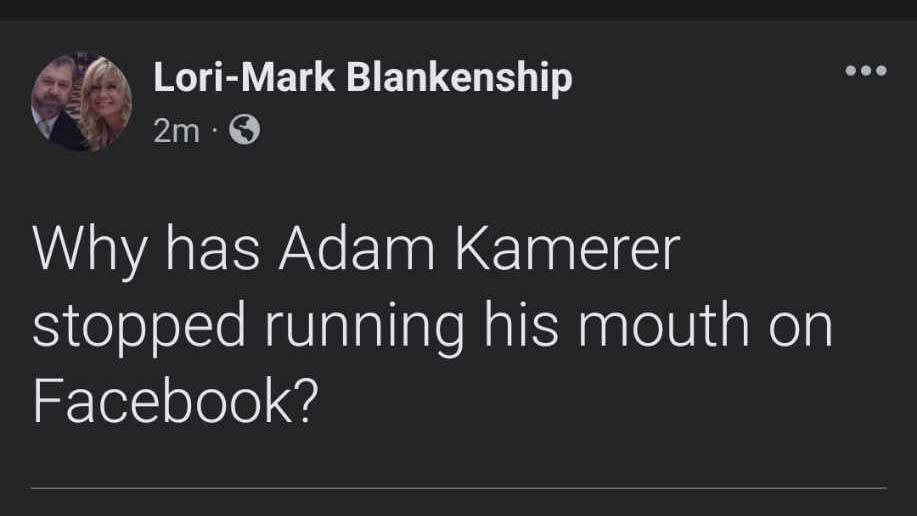
A post by the Lori-Mark Blankenship Facebook account taunts Ozark citizen Adam Kamerer.
Shortly after sending Kamerer the Facebook message, the Lori-Mark Blankenship account posted “Why has Adam Kamerer stopped running his mouth on Facebook?” It is again not clear whether Mark or Lori made the post, or if they posted it as a joint statement. The post was deleted shortly after.
Asked if he had a statement on the threat, Kamerer simply responded with a photo of a quote by Benjamin Disraeli: “Courage is fire, and bullying is smoke.”
“You’d think (Wednesday) would have been a valuable lesson about the persistence of online communication,” said Brittany Galland, a friend of Kamerer and founder of the Ozark Book Club. “Some people are slow learners.”
Kamerer started a Facebook group in response to Blankenship’s call to defund the library, gathering advocates in support of the library and has been a major organizer in contacting Ozark City Council members, Dale County Commissioners and library board directors.
Lori Blankenship spoke out against Kamerer reading the messages during the public meeting, yelling above the fray of the crowd “He didn’t start with the first text.”
After Lori’s outburst, the board broke for lunch. At the advisement of police and with the agreement of Library Director Karen Speck and Library Board chair Liz Delaney, the board decided not to let Kamerer finish his comment. A statement by library board vice chair Mike Cairns Friday clarified his misstatement during the meeting that the board had voted not to let Kamerer finish his comment.
“There were concerns of inciting a riot,” Cairns said in the statement.
APR reached out to Mark Blankenship to clarify the attribution of the Facebook message to Kamerer but received no response before publishing time. Blankenship had informed an APR reporter in a previous interview that he did not intend to speak to APR any further.






































